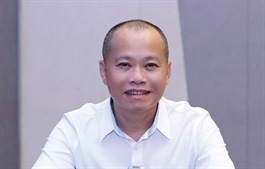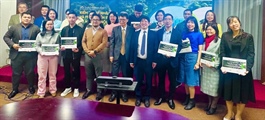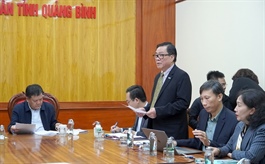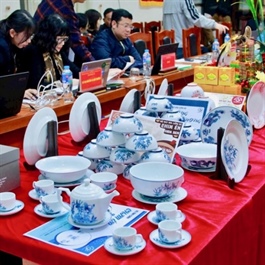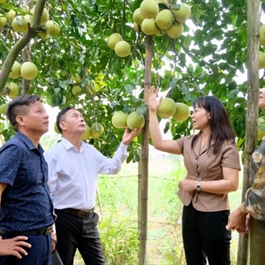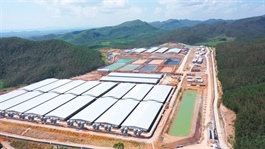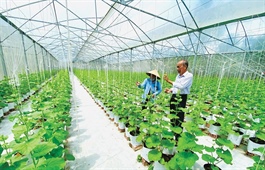Vietnam cultivates modern workforce
Vietnam cultivates modern workforce
Aware of the high-tech workforce shortage amid tech giants flocking to Vietnam, the government has proposed training roadmaps alongside direct initiatives by tech corporations, with a strong focus on AI.
According to the Vietnam IT Workforce Report released by TopDev in September 2024, the IT sector in Vietnam was expected to require 700,000 personnel by the end of 2025. However, the actual workforce is projected to reach only 530,000, leaving a shortfall of nearly 200,000 skilled workers.

New disciplines, especially in high-tech areas, are being integrated into academia and training systems Photo: Le Toan |
This talent shortage poses a dual challenge for Vietnamese businesses, addressing the workforce gap while optimising internal resources during the digital transformation era.
“Vietnam is a country that has the potential to develop a comprehensive technology force, with highly qualified personnel in AI, blockchain, fintech, edutech, medtech, and gaming. There are currently only two nations in the world with companies exporting software exceeding $1 billion, and one of those is Vietnam,” said Truong Gia Binh, chairman of FPT Corporation.
“It is no coincidence that Nvidia chose Vietnam as its second home at this moment in the digital era of our country. And many other technology corporations will continue to choose Vietnam in the same way,” he added.
To address the issue of technology giants knocking at the door but a scarcity of high-tech personnel, the Ministry of Education and Training (MoET) is gathering opinions on human resource training for high-tech development to cover the next 10 years. The feedback and revisions are still under review from relevant authorities.
“Qualified human resources will be the key for emerging technology fields, becoming a core competitive factor between nations. However, like many countries worldwide, Vietnam’s greatest challenge right now is the shortage of skilled personnel in science, technology, engineering, and mathematics (STEM) fields that meet the requirements of large technology corporations,” said Deputy Minister Hoang Minh Son.
“This shortage poses the greatest risk of Vietnam missing out on investment into high-tech industries, restructure the economy, improve labour productivity, and enhance national competitiveness,” he added.
The MoET expects that approximately 5,000 engineers and 500 people with PhDs will graduate annually from talent training in key tech fields, with at least 20 per cent specialising in AI.
On January 9, the government issued an action plan to implement breakthroughs in sci-tech and innovation, with two main goals and seven specific tasks aimed at making national digital transformation a priority.
Integrated solutions will be implemented for STEM education and career guidance, discover and nurture STEM talent from an early age, as well as upgrade the specialised science and technology schools, the resolution stated. Public online services will be fully provided and personalised, and public-private partnerships in digital technology workforce training will be expanded.
“The commitments on policies such as increasing investment, administrative reform, supporting creative startups, and collaboration between research institutes, universities, and businesses help create a more practical and conducive environment for applying research results,” said Prof. Dr. Tran Tuan Anh, vice president of the Vietnam Academy of Science and Technology. “The sci-tech and innovation focus also opens up creative space for intellectuals and scientists to seize significant opportunities in fields such as AI, biotechnology, renewable energy, big data, and digital transformation.”
At a conference to set tasks for 2025 hosted by the Ministry of Science and Technology on December 30 in Hanoi, Deputy Minister Le Xuan Dinh identified the development of strong talent for the semiconductor industry, AI, and cloud computing.
“We will form and develop strong research groups, provide conditions for young research teams, prioritise policies, and create favourable environments to attract Vietnamese scientists abroad to join in the development of science, technology, and innovation in Vietnam,” said Dinh.
Pham Thanh Hai, CEO of JobsGO, shared that Vietnam currently does not have a competitive advantage in developing and training core models, such as ChatGPT, Claude, or Llama. “Training new AI models can cost several hundred million dollars each time, making it difficult for Vietnam to compete in this highly specialised area,” Hai said.
However, Vietnam can leverage its strengths in building AI products and integrating it into businesses, Hai explained.
“With a pool of over 500,000 high-quality programmers and a strong digital transformation movement underway, Vietnam has the potential to become a leader in developing AI-powered solutions and automating business processes. A new trend may emerge where companies across various sectors adopt AI to optimise operations and drive growth,” added Hai.
Meanwhile, Le Thanh Hai, deputy general director of SVTech, stated that the biggest issue in high-tech workforce training lies in inadequate investment in facilities and course content lacking research and development.
“New disciplines such as AI ethics officers, supervisors, and human-AI interaction specialists should be integrated into academic and professional training systems. This approach not only addresses emerging demands but also ensures a well-rounded and future-proof workforce ready to embrace rapid technological advancements,” Hai said.
Besides that, robust infrastructure is critical to supporting technological human resource developing progress. “On the hardware front, high-speed telecommunications systems and AI data centres equipped with advanced security measures are essential foundations. On the software side, flexible regulatory frameworks aligned with global standards, coupled with incentive-driven policies, will foster a conducive environment for investment and innovation,” he added.
|
Nguyen Quynh Tram, country general manager Microsoft Vietnam
Vietnam has a clear potential to become a global technology hub, driven by its young, dynamic workforce eager to adopt new technologies, a competitive IT talent pool of 560,000 professionals, a stable economy fostering growth, and robust government policies on AI integration and tech education. We view education as a critical foundation for personal and societal growth. Since our inception in Vietnam, we have been leading different targeted initiatives to shape an inclusive high-tech workforce. The company has built a network of thousands of local partners and enabled them with the essential skills and latest technologies to accompany local businesses in their digital transformation. For startups and developers, we provide free programmes and resources to help solve their challenges, accelerate growth, and turn their innovative ideas into viable tech startups, such as Startup Founder Hub or the Microsoft 365 Developer initiative. In particular, last year we set up a research and development engineering team both in Hanoi and Ho Chi Minh City, and are actively expanding this local team to service our global-scale projects. Furthermore, we also focus on training and upskilling the underserved and underrepresented communities, including female developers, with the Code Without Barriers initiative to reduce gender disparity in tech; and assist teachers and educators with the Microsoft Innovative Educator Experts programme to help integrate technology into the classrooms. Every year, we also host the Imagine Cup contest to inspire students to leverage the latest technologies such as AI to address real-world and societal problems. The company also provides a wide range of online training courses which cover various skills, including AI fundamentals and data science, and Azure AI engineering on Microsoft Learn and LinkedIn Learning, which are easily accessible to everyone, to upskill anytime and anywhere. |




